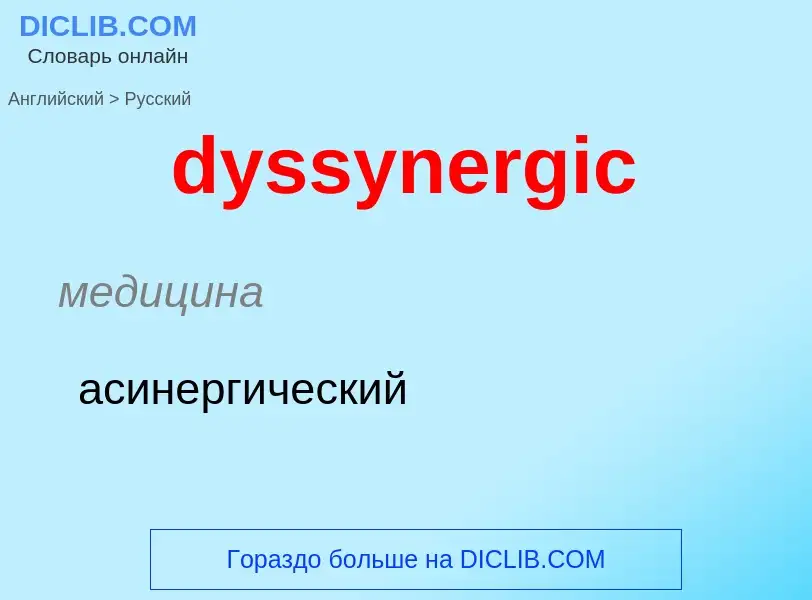Μετάφραση και ανάλυση λέξεων από την τεχνητή νοημοσύνη ChatGPT
Σε αυτήν τη σελίδα μπορείτε να λάβετε μια λεπτομερή ανάλυση μιας λέξης ή μιας φράσης, η οποία δημιουργήθηκε χρησιμοποιώντας το ChatGPT, την καλύτερη τεχνολογία τεχνητής νοημοσύνης μέχρι σήμερα:
- πώς χρησιμοποιείται η λέξη
- συχνότητα χρήσης
- χρησιμοποιείται πιο συχνά στον προφορικό ή γραπτό λόγο
- επιλογές μετάφρασης λέξεων
- παραδείγματα χρήσης (πολλές φράσεις με μετάφραση)
- ετυμολογία
dyssynergic - translation to ρωσικά
медицина
асинергический
общая лексика
подпертый
имеющий основу
усиленный
медицина
запор
застой желудка
задержка стула
копростаз
обстипация
Βικιπαίδεια
Constipation is a bowel dysfunction that makes bowel movements infrequent or hard to pass. The stool is often hard and dry. Other symptoms may include abdominal pain, bloating, and feeling as if one has not completely passed the bowel movement. Complications from constipation may include hemorrhoids, anal fissure or fecal impaction. The normal frequency of bowel movements in adults is between three per day and three per week. Babies often have three to four bowel movements per day while young children typically have two to three per day.
Constipation has many causes. Common causes include slow movement of stool within the colon, irritable bowel syndrome, and pelvic floor disorders. Underlying associated diseases include hypothyroidism, diabetes, Parkinson's disease, celiac disease, non-celiac gluten sensitivity, vitamin B12 deficiency, colon cancer, diverticulitis, and inflammatory bowel disease. Medications associated with constipation include opioids, certain antacids, calcium channel blockers, and anticholinergics. Of those taking opioids about 90% develop constipation. Constipation is more concerning when there is weight loss or anemia, blood is present in the stool, there is a history of inflammatory bowel disease or colon cancer in a person's family, or it is of new onset in someone who is older.
Treatment of constipation depends on the underlying cause and the duration that it has been present. Measures that may help include drinking enough fluids, eating more fiber, consumption of honey and exercise. If this is not effective, laxatives of the bulk-forming agent, osmotic agent, stool softener, or lubricant type may be recommended. Stimulant laxatives are generally reserved for when other types are not effective. Other treatments may include biofeedback or in rare cases surgery.
In the general population rates of constipation are 2–30 percent. Among elderly people living in a care home the rate of constipation is 50–75 percent. People spend, in the United States, more than US$250 million on medications for constipation a year.


![[[Bristol stool chart]] [[Bristol stool chart]]](https://commons.wikimedia.org/wiki/Special:FilePath/BristolStoolChart.png?width=200)
.png?width=200)
